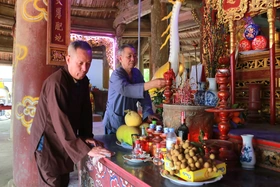{title}
{publish}
{head}
For the Vietnamese people, spring is synonymous with festival season. In the land that is the cradle of the nation, there are currently over 300 traditional festivals recorded, most of which take place during spring. Each festival embodies rich intangible cultural heritage (ICH) that reflects the unique traditions of the Land of Ancestors.

According to Ms. Pham Nga Viet, Head of the Cultural Heritage Management Department under the Department of Culture, Sports, and Tourism, Phu Tho is home to 22 nationally recognized intangible cultural heritage elements. Many of these are traditional festivals, such as the Dao Xa Communal House Festival, Lang Suong Temple Festival, Tro Tram Festival, Bach Hac and Tam Giang Temple Festival, Chu Hung Temple Festival, Hung Lo Communal House Festival, Van Luong Temple Festival, Chua Gai Procession Festival, Du Yen Temple Festival, the Forest-Opening Ceremony of the Muong ethnic people in Yen Lap District, and the Vinh Mo Communal House Wrestling Festival.
The Dao Xa Communal House Festival, held in Thanh Thuy District, is particularly known for its elephant procession and takes place annually on the 27th, 28th, and 29th days of the first lunar month. It was recognized as a national intangible cultural heritage in November 2016. This festival honors Hung Hai Cong, the 19th son of the Hung King, who contributed to land reclamation, water management, farming, animal husbandry, and the establishment of prosperous villages.
This year, in addition to the traditional ceremonies such as the elephant procession, incense offering, sacred palanquin, ancestral tablets, royal edicts, and ritual tributes to the village deity, the festival also features vibrant folk games. These include tug-of-war, chicken snatching, water fetching, rice pounding, fire-making, and a rice-cooking competition, all of which add to the festival’s lively and authentic cultural experience.

As a land where multiple ethnic groups coexist, Phu Tho boasts a diverse and rich cultural heritage, spanning languages, scripts, traditional attire, folk knowledge, folk performing arts, and traditional festivals. Among these, two elements have been recognized by UNESCO as Representative Intangible Cultural Heritage of Humanity: Xoan Singing of Phu Tho and the Worship of Hung Kings in Phu Tho.
The province has implemented various comprehensive measures to preserve and promote these cultural values while integrating them into community life. Many localities have issued resolutions and initiatives to safeguard and enhance traditional cultural values. Innovative approaches have been adopted to support the preservation of ethnic minority cultures, such as establishing cultural clubs for the Muong and other ethnic groups, providing support for purchasing gongs, creating Muong cultural spaces in schools, offering classes on the Nom Dao script, and reviving traditional festivals.
Each festival itself represents an intangible cultural heritage, containing within it numerous other heritage elements such as the Worship of Hung Kings, the drum-piercing and tube-tapping rituals, Senh Tien dance, Xuc Tep Chim Gau dance, and traditional cuisine reflecting the distinct identity of the Land of Ancestors, including Banh Chung, Banh Giay, five-colored sticky rice, and leaf tray feast.
The preservation and promotion of ethnic cultural identity rely heavily on continuity and active participation, especially from the younger generation. In reality, students from secondary and high schools are already taking part in various rituals and folk performances at festivals. They carry flags and ceremonial weapons in processions, participate in the female officiant ritual at the Au Co Mother Temple Festival, join the “Descendants of Lac and Hong” procession, perform the Senh Tien dance at the Thach Khoan Communal House Festival, take part in the celestial dance at the Du Yen Temple Festival, and even assume the role of Chua Gai in the Chua Gai Procession Festival. Their involvement plays a crucial role in safeguarding and promoting the unique cultural essence of the Land of Ancestors.
Phuong Thanh

baophutho.vn The traditional art of creating skirt patterns among the Muong people, originally in Hoa Binh province, now part of Phu Tho province, has been...

baophutho.vn The Ministry of Culture, Sports, and Tourism has officially released the latest List of National Intangible Cultural Heritages, with the newly...

baophutho.vn With the desire not only to preserve the cultural space of the ancient Muong people but also to build a high-quality tourism destination rich...

baophutho.vn Phu Tho—the land of national origins—is home to more than 1,064 valuable historical and cultural relics. In recent years, efforts to enhance...

baophutho.vn For generations, ethnic minority communities in Thanh Son District have steadfastly preserved their traditional cultural values—woven deeply...

baophutho.vn In Yen Luong Commune, Thanh Son District, the only Tho ethnic community in Phu Tho Province has lived in harmony and unity for over half a...

baophutho.vn In recent years, Tan Son District has consistently prioritized the preservation and promotion of the traditional cultural values of its ethnic...

baophutho.vn Thanh Son, a mountainous district in Phu Tho province, is home to a large ethnic minority population, primarily the Muong and Dao communities....

baophutho.vn On the evening of April 27, the exhibition titled “Tourism Space, Cultural Heritage, Scenic Spots, and Traditional Handicraft Products of...

baophutho.vn Cassava cake has long been a beloved specialty of the people in the Land of the Hung Kings. Each region, and even each household, has its own...

baophutho.vn According to the Department of Culture, Sports, and Tourism, the Hung Kings’ Commemoration Day and the 2025 Fatherland Culture and Tourism Week...

baophutho.vn With a rich historical and cultural tradition, Lam Thao – the Land of Rice and Culture is home to more than 20 festivals, most of which are...